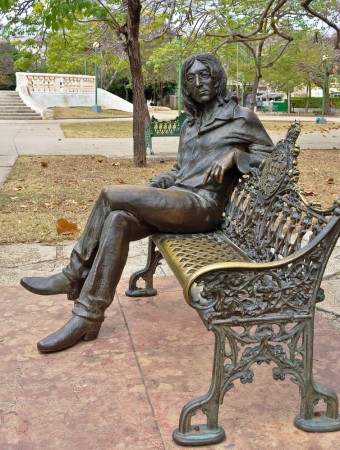This Day in History: October 7th
Today in History: October 7, 1975
 A deportation order for John Lennon was reversed on this day in 1975, which allowed Lennon to legally remain in his adoptive home of New York City with his wife, Yoko Ono.
A deportation order for John Lennon was reversed on this day in 1975, which allowed Lennon to legally remain in his adoptive home of New York City with his wife, Yoko Ono.
After the invasion of Cambodia on April 30, 1970, and the shootings of four student protestors at Kent State just four days later, protests against the Vietnam War gained intensity. Many protests were peaceful gatherings with demonstrators singing Lennon’s 1969 anthem “Give Peace a Chance,” but other gatherings were less benign.
Right after John Lennon moved to New York City, he began to associate with such well known radicals as Jerry Rubin, Abbie Hoffman and Bobbie Seale. The White House apparently grew concerned, and seemingly had nothing better to do than worry about who an ex-Beatle was hanging out with.
According to the 2006 documentary “The U.S. vs. John Lennon,” Nixon lost sleep over Lennon’s influence with the 18-20-year-olds who were going to be allowed to vote for the very first time in the 1972 presidential election. “I suppose if you were going to list your enemies and decide who is most dangerous,” Walter Cronkite later said. “If I were Nixon, I would put Lennon up near the top.”
Senator Strom Thurmond from South Carolina agreed, and he wrote a letter to the White House wearing his hat as Chairman of the Senate Internal Security Committee that moved the government to take action. Although an FBI investigation of Lennon failed to turn up any evidence of illegal activities, the matter was still turned over to the Immigration and Naturalization Service, which immediately began deportation proceedings against Lennon and his wife Yoko Ono, using a 1968 English marijuana conviction as their basis for doing so.
Leon Wildes, the immigration attorney who handled Lennon’s case, said of his client’s reaction to the proceedings, “He understood that what was being done to him was wrong. It was an abuse of the law, and he was willing to stand up and try to show it—to shine the big light on it.”
Lennon’s patience and persistence paid off in the end, as the court’s decision made no bones about the fact that it too was not blind to the real reason behind the deportation proceedings. Judge Irving Kaufman stated:
The courts will not condone selective deportation based upon secret political grounds… Lennon’s four-year battle to remain in our country is testimony to his faith in this American dream.
Lennon was, thus, allowed to stay and he later got his green card in June of 1976.
On December 8th, 1980 when returning to his apartment in New York, he was shot and killed by Mark David Chapman… Interesting to think it’s possible that being deported might have actually worked out better for him in the long run, despite the complete injustice of it all. Although, it may not then have worked out for one of: Walter Cronkite, Elizabeth Taylor, Johnny Carson, Jacqueline Kennedy Onassis, or George C. Scott, who were all people Chapman considered killing before settling on Lennon because he was the easiest to locate, as it wasn’t hard to find out what building he lived in in New York.
If you liked this article, you might also enjoy our new popular podcast, The BrainFood Show (iTunes, Spotify, Google Play Music, Feed), as well as:
- When John Lennon Almost Beat a Man to Death
- 12 Facts You May Not Know About John Lennon
- The Day John Lennon Met Paul McCartney
- Why the Beatles Split Up
| Share the Knowledge! |
|





2 comments